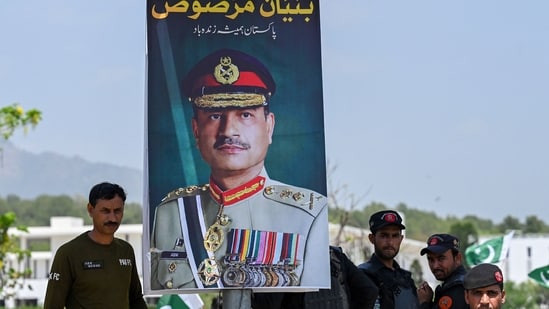Munir reportedly said at a meeting with the Pakistani diaspora in the US that Pakistan could use its nuclear weapons to take down India and “half the world”. Pakistan Army chief Asim Munir’s fresh nuclear threats against India reinforce doubts about the integrity of nuclear command and control in a country where the “military is hand-in-glove with terrorist groups”, the external affairs ministry said on Monday while reiterating that New Delhi won’t give in to nuclear blackmail.
External affairs ministry spokesperson Randhir Jaiswal said it was “regrettable” that Munir made the remarks while in a friendly country such as the US, and contended that “nuclear sabre-rattling is Pakistan’s stock-in-trade.”
Munir, elevated to the rank of field marshal after four days of hostilities with India in May, reportedly said at a meeting with the Pakistani diaspora in Florida that Pakistan could use its nuclear weapons to take down India and “half the world” in the event of an existential threat in any future conflict with India. He reportedly said Pakistan can use its missiles to destroy any dams built by India on cross-border rivers after the suspension of the Indus Waters Treaty.
“The international community can draw its own conclusions on the irresponsibility inherent in such remarks, which also reinforce the well-held doubts about the integrity of nuclear command and control in a state where the military is hand-in-glove with terrorist groups,” Jaiswal said in a statement.
“It is also regrettable that these remarks should have been made from the soil of a friendly third country,” Jaiswal said, “India has already made it clear that it will not give in to nuclear blackmail. We will continue to take all steps necessary to safeguard our national security.” People familiar with the matter said Munir’s remarks demonstrated once again Pakistan’s irresponsible approach towards its nuclear arsenal and its role as a driver of nuclear instability in South Asia.
Munir’s remarks were in line with the nuclear blackmail resorted to by Pakistan for several decades, and this is one of the reasons why the country is widely considered an irresponsible nuclear-armed state, they said on condition of anonymity. The risk of Pakistan’s nuclear materials or expertise falling into the hands of non-state actors such as terror groups is a reason why the international community “does not trust nuclear weapons in the hands of an institution like the Pakistani military, which is accountable to no one”, one of the people cited above said.
Noting that Munir had made the remarks at an event held on American oil, the people questioned whether the US administration and the international community, with its repeated emphasis on containing nuclear conflict, will hold Pakistan to account for such provocative statements.
Munir’s remarks, reportedly made at a dinner hosted at Tampa in Florida by a Pakistani businessman, were reported by ThePrint. Munir visited the US for the second time since June, when he was hosted at the White House by President Donald Trump, to attend a ceremony marking the change in leadership of the US Central Command, based in Florida. The Pakistani military’s media arm acknowledged Munir’s participation in an interactive session with the Pakistani diaspora in Florida but provided few details. Experts said Munir’s reported remarks were in line with his stance on India and his religious conservatism.
The people said Munir’s remarks were also in line with Pakistan’s history of rhetorical nuclear brinkmanship while simultaneously claiming the mantle of a “responsible” nuclear actor. The central driver of nuclear instability in South Asia is Pakistan’s military establishment holding the nuclear button, the people said.
“Pakistan’s military-controlled democracy is a sham and is clearly a facade, with the military controlling key levers of power. The favourable international reception may embolden the Pakistani military brass, and the world community overlooking Pakistan’s hand in cross-border terrorism raises concerns about a silent coup and potential direct rule by the army chief,” the person cited above said. The people also noted that periods of US support for Pakistan’s military are followed by overtly aggressive postures by the generals in Rawalpindi.
The Pahalgam terror attack on April 22, during which attackers identified and shot dead 25 men on the basis of their faith, was carried out less than a week after Munir, during a speech to the Pakistani diaspora in Islamabad, described Jammu and Kashmir as Pakistan’s “jugular vein” and noted that Hindus and Muslims cannot live together, the people pointed out. They also questioned whether Munir’s latest remarks signalled another impending attack.
India launched Operation Sindoor on May 7 to target terrorist infrastructure in territories controlled by Pakistan to retaliate for the Pahalgam terror attack. This triggered four days of hostilities, during which the two sides used drones, missiles and other long-range weapons. The conflict ended when the two countries reached an understanding on May 10 to end military actions. However, the Indian government has maintained that Operation Sindoor has not ended.



